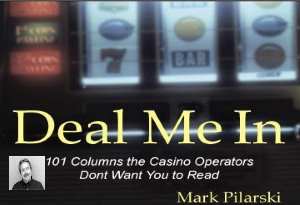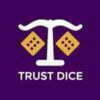Do casinos set Multi-play video poker machines so that a more powerful hand doesn’t appear on the initial deal, so they can avoid a very large payday for the player playing multiple hands? Alex G.
Multi-play video poker games are offered in “Triple Play”, “Five Play”, “Ten Play”, “Fifty Play” and even “One Hundred Play” versions.
With Multi-play machines, once you chose the number of hands you wish to play, you hit the deal/draw button. Five up-cards will appear on the first hand only. All the additional poker hands will now play from the cards you hold from these first five cards. As you select the cards you want to keep, identical hold cards will appear in the remaining hands. Now, you press the deal/draw button once more to draw. Each poker hand will be dealt different draw cards. For each hand that is a winner, the poker machine will indicate your winnings by a notice flashed on top of the winning hand(s).
That’s how they work, Alex, but are the casinos rigging your payday
By law, the casino may not set the machines so they do not deal high-paying hands. Video poker machines by all U.S. manufacturers deal the cards as if you were dealing them yourself from a deck at your kitchen table, only electronically. On the deal, every possible five-card hand is equally likely to be dealt–even a beginning hand containing a straight flush.
Some additional points, Alex, if I may. When you indulge in multi-play games, search out the best paytables. Generally speaking, better paytables are found on single play versions, not multi-play games, but, some oddballs do exist.
The odds do not change if you play one or one hundred hands on games with the same pay table, so don’t change strategy when you go from a single to a multi-play game. If you are playing Ten Play full pay 9/6 Jacks or Better, the pay back is 99.54% — the same as in single play.
One final point to keep in mind when choosing between a single or multi-play game is the cost. A hundred hands on a quarter machine at $1.25 per hand is definitely a bankroll buster.
It seems that it’s getting tougher and tougher at video poker to hit mid-range hands like full houses and four-of-a kinds where I play. Any chance the casino is tightening the machines? Gail B.
Over the past few weeks, I’ve spent some quality time discussing, a) identifying full pay video poker machines, and b) an individual’s gambling timeline: The gist being, are you seeking out the best paytables, and, anything can and will happen during your casino visit. Possibly, Gail, you are on a losing streak, maybe from hell.
Still, I’ll shift gears, and talk about the casino taking a screwdriver to loosen or tighten video poker machines at will.
Can they? Yes. Do they? Probably not, especially not with any frequency.
The house can change the payback on any machine, any time it wants. However, it is just not cost-effective for the casino to continually alter the payouts on their machines. To alter the percentage return in their favor, the casino must, by law, make a hardware change. This is done by swapping out an internal component, the ROM portion of the microprocessor chip. ROM, or read only memory, is a chip the slot manufacturer provides to the casino. This is the chip that tells the video poker machine to pay 9 coins for a full house, 6 coins for a flush, etc. Additionally, the casino would have to physically change the glass payout schedules on their machines. And beyond that, some state gaming commissions won’t allow casinos to switch chips in-house. Casinos in those jurisdictions have to send the machines back to the manufacturer for any such surgery.
You might see a seasonal wholesale change to improve their theoretical hold, changing all 9/6 machines to 8/5 or 7/5 machines, but making the change is a lengthy process. What they definitely can’t do is throw a secret switch to instantly tighten their machines.
Gambling Wisdom of the Week: “I also hear the nonsense about the casinos trying to get you drunk, so that you will play stupid and lose. Let me tell you my friend, a lot of players don’t have to get drunk to play stupid.” –John Patrick, So You Want to be a Gambler




















